中国春节的来历-英文介绍
春节来历的英文带翻译
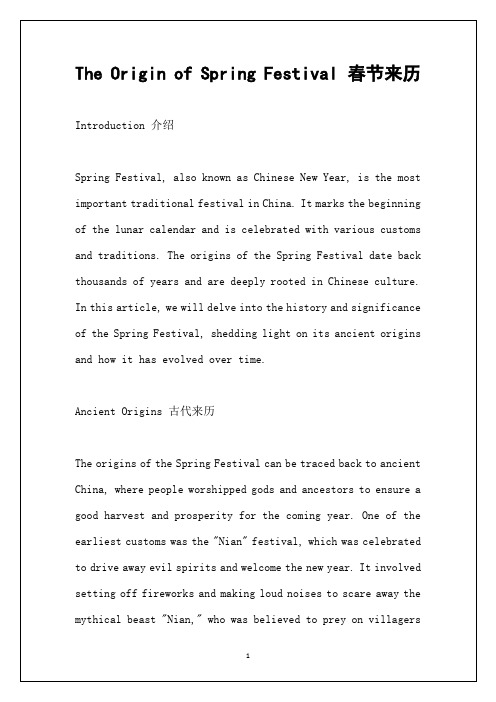
Introduction 介绍
Spring Festival, also known as Chinese New Year, is the most important traditional festival in China. It marks the beginning of the lunar calendar and is celebrated with various customs and traditions. The origins of the Spring Festival date back thousands of years and are deeply rooted in Chinese culture. In this article, we will delve into the history and significance of the Spring Festival, shedding light on its ancient origins and how it has evolved over time.
在中国北方,春节期间的天气经常更冷,因此人们喜欢进行冰上运动和滑雪。他们还有一起制作和食用饺子的传统。春节期间制作饺子不仅可以让家庭团聚,还象征着好运和财富。
春节不仅是一个庆祝的时刻,也深深扎根于中国文化和历史。它已经发展了数千年,融合了古老的习俗和信仰,同时拥抱新的传统。家庭、团圆和良好祝福的意义仍然是这个节日的核心。无论通过交换红包、点亮灯笼还是制作传统食物,春节使人们团结在一起,培养了团结和对未来的希望感。这是对过去、现在和未来的庆祝,将继续被后代珍视和庆祝。
Evolution and Traditions 演变和传统
春节的由来英语

春节的由来英语春节的由来英语 每逢春节来临,⼈们就有了⼀周的休息时间,不管家离得有多远,都会回家过年。
你们对春节的来历和习俗有多少的了解吗?以下是由yjbys⼩编为⼤家收集整理的英语春节的由来,欢迎⼤家学习参考。
⼀、春节来历的英⽂介绍 Origin of the Spring Festival Spring Festival is the lunar Suishou,is also our ancient traditional festivals.Ancient-off "year"is not in the twelfth lunar month on the 29th or on the 30th,but in the "wax on",that later,"Laba."Southern and Northern Dynasties later,the "wax Festival"to the end of the year.To the Republican era,the switch to Gregorian calendar was only then that the lunar year is called "Spring Festival",because the Spring Festival is generally in the "Spring,"both before and after. 翻译:春节,是农历的岁⾸,也是我国古⽼的传统节⽇.古代过“年”不是在腊⽉⼆⼗九⽇或三⼗⽇,⽽是在“蜡⽇”,即后来的“腊⼋”.南北朝以后,把“蜡祭”移⾄岁末.到了民国时,改⽤阳历,才把阴历年叫“春节”,因为春节⼀般都在“⽴春”前后。
Spring Festival is China's biggest and most exciting festival of an ancient monly known as "Chinese New Year."According to China's Lunar New Year,the first month who started in ancient times known Mongol Yuan Chen,Yuan-cheng,Yuan Shuo,New Year's Day and so on,commonly known as New Year's Day,as well as the previous day,moving in,three new moon,three North Korea,the three began,ternary,etc.Do not say,which means the first month who started this is the year,month,day three start. 翻译:春节是我国最盛⼤、最热闹的⼀个古⽼传统节⽇。
关于春节的来历英语作文加翻译
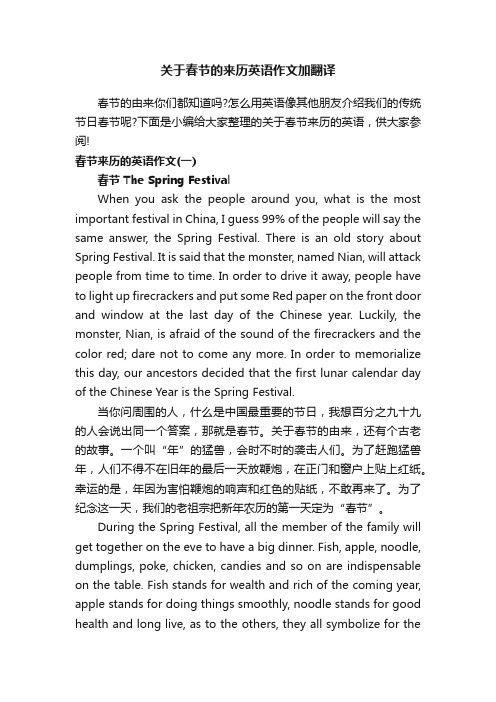
关于春节的来历英语作文加翻译春节的由来你们都知道吗?怎么用英语像其他朋友介绍我们的传统节日春节呢?下面是小编给大家整理的关于春节来历的英语,供大家参阅!春节来历的英语作文(一)春节 The Spring FestivalWhen you ask the people around you, what is the most important festival in China, I guess 99% of the people will say the same answer, the Spring Festival. There is an old story about Spring Festival. It is said that the monster, named Nian, will attack people from time to time. In order to drive it away, people have to light up firecrackers and put some Red paper on the front door and window at the last day of the Chinese year. Luckily, the monster, Nian, is afraid of the sound of the firecrackers and the color red; dare not to come any more. In order to memorialize this day, our ancestors decided that the first lunar calendar day of the Chinese Year is the Spring Festival.当你问周围的人,什么是中国最重要的节日,我想百分之九十九的人会说出同一个答案,那就是春节。
春节作文之春节由来英语作文
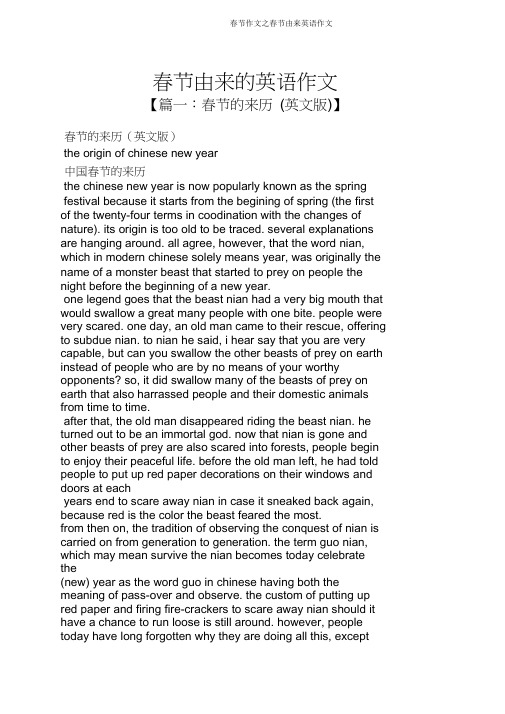
春节由来的英语作文【篇一:春节的来历(英文版)】春节的来历(英文版)the origin of chinese new year中国春节的来历the chinese new year is now popularly known as the springfestival because it starts from the begining of spring (the first of the twenty-four terms in coodination with the changes of nature). its origin is too old to be traced. several explanations are hanging around. all agree, however, that the word nian, which in modern chinese solely means year, was originally the name of a monster beast that started to prey on people the night before the beginning of a new year.one legend goes that the beast nian had a very big mouth that would swallow a great many people with one bite. people were very scared. one day, an old man came to their rescue, offering to subdue nian. to nian he said, i hear say that you are very capable, but can you swallow the other beasts of prey on earth instead of people who are by no means of your worthy opponents? so, it did swallow many of the beasts of prey on earth that also harrassed people and their domestic animals from time to time.after that, the old man disappeared riding the beast nian. he turned out to be an immortal god. now that nian is gone and other beasts of prey are also scared into forests, people begin to enjoy their peaceful life. before the old man left, he had told people to put up red paper decorations on their windows and doors at eachyears end to scare away nian in case it sneaked back again, because red is the color the beast feared the most.from then on, the tradition of observing the conquest of nian is carried on from generation to generation. the term guo nian, which may mean survive the nian becomes today celebratethe(new) year as the word guo in chinese having both the meaning of pass-over and observe. the custom of putting up red paper and firing fire-crackers to scare away nian should it have a chance to run loose is still around. however, people today have long forgotten why they are doing all this, exceptthat they feel the color and the sound add to the excitement ofthe celebration.【篇二:对于春节的英文介绍】对于春节的英文介绍spring festival1the spring festival is the most important festival for thechinese people and is ○when all family members get together, just like christmas inthe west. all people living away from home go back, becomingthe busiest time for transportation systems of about half amonth from the spring festival. airports, railway stations andlong-distance bus stations are crowded with home returnees.(春节是中国人民最重要的节日,全部家庭成员聚在一同,在西方圣诞节同样。
用英语介绍春节的来历简短
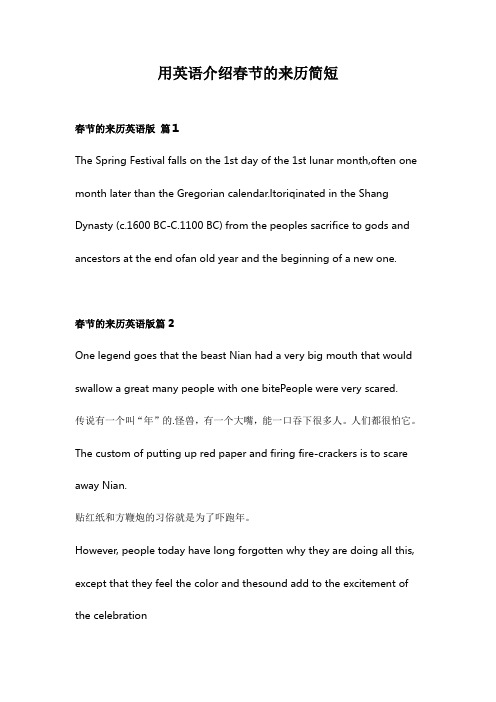
用英语介绍春节的来历简短春节的来历英语版篇1The Spring Festival falls on the 1st day of the 1st lunar month,often one month later than the Gregorian calendar.ltoriqinated in the Shang Dynasty (c.1600 BC-C.1100 BC) from the peoples sacrifice to gods and ancestors at the end ofan old year and the beginning of a new one.春节的来历英语版篇2One legend goes that the beast Nian had a very big mouth that would swallow a great many people with one bitePeople were very scared.传说有一个叫“年”的.怪兽,有一个大嘴,能一口吞下很多人。
人们都很怕它。
The custom of putting up red paper and firing fire-crackers is to scare away Nian.贴红纸和方鞭炮的习俗就是为了吓跑年。
However, people today have long forgotten why they are doing all this, except that they feel the color and thesound add to the excitement of the celebration但是,现在人们大多忘记了为什么这么做的原因,只是觉得色彩和响声增加了过节的气氛罢了!春节的来历英语版篇3The lunar calendar new year origin, has the basis, also is rich and picks the varied fable to be possible to trace toseveral millenniums before: Most is famous is "the year beast" fable."The vear beast" is a cruel terrible wild animal, ancient times the person believed "year beast" when lunar NewYears Eve niaht can come out eats the person.The fable "the vear beast" extremely fears red, the flame and guarels the mixed sound, the people on paste thered paper in the gate, and selects the torch all night, is setting off the artillery candle, avoids "the vear beast"To second day early morning, "has congratulated" the sound to the ear, in the air does not fill the air is defeating"the year beast" the victory and the rebirth joy.。
春节的来历英语简介带翻译
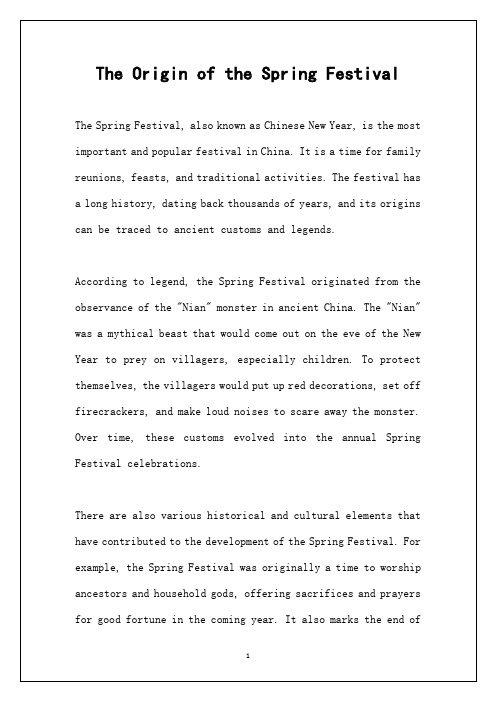
总之,春节是一个千百年来传承下来的传统,对中国文化有着深远的意义。它的起源可以追溯到古老的习俗和传说,它继续是人们庆祝传统和家庭价值观的时刻。节日已经随着时间的推移而发展,但其本质仍然不变——这是一个更新、希望和光明未来的时刻。
The Origin of the Spring Festival
The Spring Festival, also known as Chinese New Year, is the most important and popular festival in China. It is a time for family reunions, feasts, and traditional activities. The festival has a long history, dating back thousands of years, and its origins can be traced to ancient customs and legends.
There are also various historical and cultural elements that have contributed to the development of the Spring Festival. For example, the Spring Festival was originally a time to worship ancestors and household gods, offering sacrifices and prayers for good fortune in the coming year. It also marks the end ofwinter and the beginning of spring, symbolizing renewal and new beginnings.
新年的来历英语版
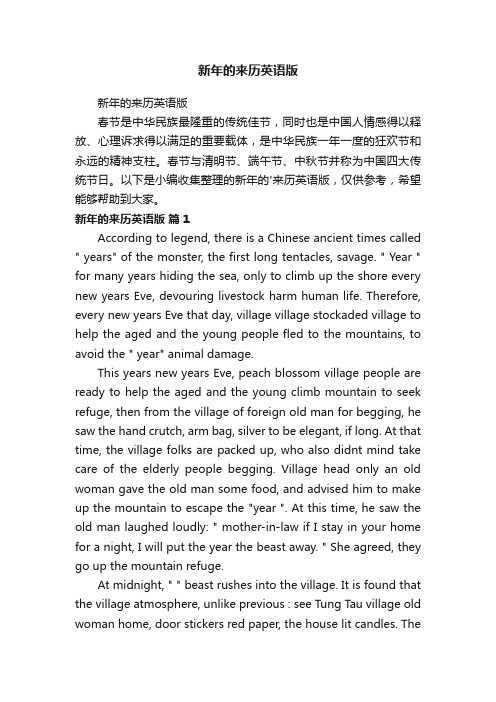
新年的来历英语版新年的来历英语版春节是中华民族最隆重的传统佳节,同时也是中国人情感得以释放、心理诉求得以满足的重要载体,是中华民族一年一度的狂欢节和永远的精神支柱。
春节与清明节、端午节、中秋节并称为中国四大传统节日。
以下是小编收集整理的新年的'来历英语版,仅供参考,希望能够帮助到大家。
新年的来历英语版篇1According to legend, there is a Chinese ancient times called " years" of the monster, the first long tentacles, savage. " Year " for many years hiding the sea, only to climb up the shore every new years Eve, devouring livestock harm human life. Therefore, every new years Eve that day, village village stockaded village to help the aged and the young people fled to the mountains, to avoid the " year" animal damage.This years new years Eve, peach blossom village people are ready to help the aged and the young climb mountain to seek refuge, then from the village of foreign old man for begging, he saw the hand crutch, arm bag, silver to be elegant, if long. At that time, the village folks are packed up, who also didnt mind take care of the elderly people begging. Village head only an old woman gave the old man some food, and advised him to make up the mountain to escape the "year ". At this time, he saw the old man laughed loudly: " mother-in-law if I stay in your home for a night, I will put the year the beast away. " She agreed, they go up the mountain refuge.At midnight, " " beast rushes into the village. It is found that the village atmosphere, unlike previous : see Tung Tau village old woman home, door stickers red paper, the house lit candles. The"year" monster tremble, strange called, wife rushed to her. Quickly to the door, the hospital from a sudden " bang bang bang bang" sound of bombing, " years " shuddered, dare not walk. The original " years" fear, red flames. At that time, the mother-in-laws family is big, wearing only a hospital Dahongpao elderly laughter. The "year " be frightened and change color, fled helter-skelter.The very next day lunar January day, people who sought refuge back to see the village safe and sound, very surprised. When the wife s only see light suddenly, hastened to the villagers about begging people promise. So, the villagers crowded together to wife in-laws, and mother-in-law house with red paper, in a pile of unburnt bamboo is still in the " pops" sound, the house a few red candle also remaining light. Tread the villagers celebrate the aushttps:///1des in succession, change clothes wearing caps, relatives and friends come to like. It soon spread around the village, people are aware of the expulsion of the "year" beast approach.Since then the annual New Years Eve, families paste red poetic couplet, setting off firecrackers, a candle lit, kept the house years. Day early in the morning, still walk a friend congratulate to ask. Later the custom spread to more and more wide, became the nations most grand traditional festival.新年的来历英语版篇2yuandan is the first day of the lunar calendar. it is the day when the earth has circled the sun for one round and is beginning another circling. it represents a new beginning when people send off the old days and welcome the new ones. as the first day of the year, yuandan has been considered to be the most important festival since the ancient times.customs1. kaisui(beginning of the year): according to the chinese traditional custom, starting from haishi(9p.m. to 11p.m.)of the last evening of the twelfth lunar month, each family must prepare offering s to deities at the altar. at the same time, they too prepare food for the new year day: the whole family will then stay awake together to attend to the year(called shou sui). after haishi, zishi(11p.m. to 1a.m.)will come, and this is the arrival of new year(yuandan). at this moment, people begin the celebration with fireworks. vegetarian and sweet foods will then be placed are the altar for offerings, and incense be burned to welcome the deities. in the ancient times, it was believed that haishi connected the two years and thus was called kaisui.。
春节的来历和英文作文

春节的来历和英文作文英文:The origin of the Spring Festival can be traced back to ancient times in China. It is believed that the festival originated from the worship of ancestors and gods, as well as the celebration of the end of winter and the beginning of spring. The date of the festival is determined by the lunar calendar, usually falling between late January and mid-February.During the Spring Festival, families gather together to enjoy a reunion dinner, exchange gifts and red envelopes filled with money, and participate in various traditional activities such as dragon and lion dances, temple fairs, and fireworks. The festival is a time for people to express their gratitude and well wishes to their loved ones, and to welcome a new year full of hope and prosperity.As a Chinese person, I have many fond memories ofcelebrating the Spring Festival with my family. I remember helping my grandparents prepare for the reunion dinner, watching the dragon dance with my cousins, and staying up late to set off fireworks with my friends. Theseexperiences have helped me appreciate the importance of family and community, and have instilled in me a sense of cultural identity and pride.中文:春节的起源可以追溯到中国古代。
- 1、下载文档前请自行甄别文档内容的完整性,平台不提供额外的编辑、内容补充、找答案等附加服务。
- 2、"仅部分预览"的文档,不可在线预览部分如存在完整性等问题,可反馈申请退款(可完整预览的文档不适用该条件!)。
- 3、如文档侵犯您的权益,请联系客服反馈,我们会尽快为您处理(人工客服工作时间:9:00-18:30)。
中国春节的来历-英文介绍
The Chinese New Year is now popularly known as the Spring Festival because it starts from the Begining of Spring (the first of the twenty-four terms in coodination with the
changes of Nature). Its origin is too old to be traced. Several explanations are hanging around. All agree, however, that the word Nian, which in modern Chinese solely means "year", was originally the name of a monster beast that
started to prey on people the night before the beginning of a new year.
One legend goes that the beast Nian had a very big mouth that would swallow a great many people with one bite. People were very scared. One day, an old man came to their rescue, offering to subdue Nian. To Nian he said, "I hear say that
you are very capable, but can you swallow the other beasts of prey on earth instead of people who are by no means of your worthy opponents?" So, it did swallow many of the beasts of prey on earth that also harrassed people and their domestic animals from time to time.
After that, the old man disappeared riding the beast Nian. He turned out to be an immortal god. Now that Nian is gone
and other beasts of prey are also scared into forests, people begin to enjoy their peaceful life. Before the old man left,
he had told people to put up red paper decorations on their windows and doors at each year's end to scare away Nian in case it sneaked back again, because red is the color the
beast feared the most.
From then on, the tradition of observing the conquest of Nian is carried on from generation to generation. The term "Guo Nian", which may mean "Survive the Nian" becomes today "Celebrate the (New) Year" as the word "guo" in Chinese having both the meaning of "pass-over" and "observe". The custom of putting up red paper and firing fire-crackers to scare away Nian should it have a chance to run loose is still around. However, people today have long forgotten why they are doing all this, except that they feel the color and the sound add to the excitement of the celebration.
中国的新年是现在俗称春节,因为它从立春开始(二十四个节气的第一个节气)。
它的起源太旧了,不可追溯。
一些解释是挂在。
不过,所有人都同意,这句话,这在现代汉语完全是“一年”,原本是一个怪物野兽的名字开始在人们的猎物前一个晚上开始的一个新的一年。
有一个传说,那兽年有一个非常大的嘴巴,一口吞了很多人。
人们很害怕。
有一天,一位老人来拯救他们,提供制服念。
他说:“我听说你很能干,但是你能把其他的野兽吞到地球上,而不是那些没有你的对手的人吗?”所以,它吞下了很多在地球上的猎物,也骚扰人民和他们的家畜不时的野兽。
在那之后,老人消失骑兽年。
他变成了一个不朽的神。
现在,“年”已经过去了,其他野兽的猎物也被惊吓到森林,人们开始享受他们的和平生活。
在老人离开之前,他曾告诉人们把红纸装饰他们的窗户和门在每年的年底吓跑年的情况下溜回来了,因为红色是颜色最害怕野兽。
从那时起,观察征服的传统是世代相传的。
“过年”,这可能意味着“生存的年”成为今天“庆祝(新的)年”作为“国”,在中国有两个“通过”和“观察”的含义。
把红色的纸和烧起来的爆竹来吓
跑的习俗应该有一个机会去跑散了。
不过,人们很早就忘记了他们为什么这样做,除了他们的颜色和声音增添了庆祝的兴奋。
